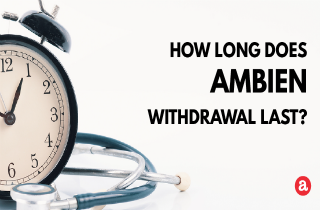ARTICLE OVERVIEW: Symptoms of Ambien withdrawal can last anywhere from a couple of days to several weeks after your last dose of Ambien. Acute withdrawal is most severe in the first 72 hours after your last dose of Ambien. Rebound insomnia or anxiety can manifest and even be intense. Withdrawal is successfully treated via tapering and behavioral therapies.
TABLE OF CONTENTS
- Who Needs to Withdraw?
- What is Withdrawal?
- Common Symptoms
- Protracted Symptoms
- Duration
- Tapering
- Medications That Help
- Alternative Treatments for Insomnia
- Detox At Home?
- Signs Of A Drug Problem
- Precautions
- Your Questions
Who Needs Withdrawal?
Ambien is a sedative-hypnotic that reduces activity in the brain to allow for sleep. Doctors do not recommend you take Ambien for longer than a couple of weeks at a time due to its potential for physical dependence and tolerance. Therefore, anyone who develops either drug dependence or tolerance can benefit from a period of detox.
Whether you are treating Ambien addiction or just want to detox from Ambien for a while, you have come to the right place. If you have become physically or psychologically dependent on Ambien, you are not alone. In 2015, the National Survey on Drug Use and Health found that approximately 18.6 million Americans were past year users of prescription sedatives in 2015, representing 6.9 percent of the population aged 12 or older. [1]
Of all prescription sedatives, Ambien was the most popular!
In 2015, an estimated 11.5 million people aged 12 or older used zolpidem products in the past year, representing 4.3 percent of the entire population and about 60 percent sedative users. Even more concerning is that about one in ten people who use Ambien are misusing it. Of the 1.5 million people aged 12 or older who misused prescription sedatives in the past year, 1.1 million misused zolpidem products.
Still, you may be wondering what withdrawal from Ambien is like. Continue reading for more on symptoms of Ambien withdrawal and how long they last. We’ll review the course of the first couple of weeks after you stop taking Ambien until the months after your last dose. We also invite you to ask any questions about Ambien you may have at the end. We love to hear from our readers, so please reach out!
What Is Withdrawal?
Withdrawal occurs when you become physically dependent on a psychoactive drug. Psychoactive means that the drug affects the mind. In fact, when you take a drug like Ambien, your brain adjusts to it. Why? It must balance out the chemistry in order to function properly. In this case, the brain produces stimulating chemicals to compensate for the sedative effects of Ambien. But why does withdrawal occur?
When you take away the Ambien, it takes some time for the brain to re-balance again. What actually happens during withdrawal is that you experience the symptoms that the drug has been masking…until the brain reaches homeostasis again.
So, the medical definition of physical dependence is a state of adaptation that is manifested by a specific withdrawal triggered by:
- Abrupt cessation
- Administration of an antagonist
- Decreasing blood level of the drug
- Rapid dose reduction
Ambien affects each person differently depending on the dosage and how long you have been taking Ambien. For those who have developed a dependency on Ambien, a longer withdrawal period is expected. They will also experience the more uncomfortable or intense symptoms of withdrawal.
Common Symptoms
A common symptom to experience with onset withdrawal is rebound insomnia. You may also have feelings of apprehension, restlessness, and increased anxiety. Withdrawal symptoms are not as likely if you’re using Ambien within the prescribed two week period, but minor symptoms may still present themselves. Other possible symptoms of withdrawal from Ambien which have been reported include:
- Abdominal cramps.
- Convulsions.
- Depression.
- Dysphoria.
- Fatigue.
- Flushing.
- Lightheadedness.
- Memory loss.
- Nausea.
- Nervousness.
- Palpitation.
- Panic attacks.
- Psychosis.
- Sweating.
- Tremors (shakes).
- Uncontrolled crying.
- Vomiting.
Ambien affects each person differently. Those who are also diagnosed with Ambien addiction or who have developed extreme dependency on Ambien may experience a more difficult withdrawal process. Hang in there and know that eventually you will feel a sense of normalcy return.
Protracted Symptoms
Additionally, former Ambien users have reported suffering Post-Acute Withdrawal Syndrome (PAWS) after Ambien use. PAWS are a set of persistent symptoms that occur right after you stop taking Ambien and persist for several weeks to months after you last dose of Ambien. The most common Ambien PAWS include:
- Anxiety.
- Depression.
- Insomnia.
- Nightmares.
Psychological effects of addiction and dependence such as craving or obsessive thinking may also still be present long after you are no longer taking Ambien. In fact, cravings and psychological needs may still be present for some people well after Ambien is no longer present in the body. This depends on your general health, your medical history, gender, weight, the length of time you’ve used Ambien, the dosing amount/frequency of Ambien dosing.
Duration
Symptoms of Ambien withdrawal can last anywhere from a couple of days to several weeks after your last dose of Ambien.
Overall symptoms of Ambien withdrawal will affect you within the first 72 hours after your last dose of Ambien. Rebound insomnia will manifest during this time as well. Most symptoms should resolve themselves after a month after your last dose of Ambien. After this period, you may still experience post-acute withdrawal syndrome for several months.
Below is a general outline of Ambien withdrawal and what symptoms to expect within each time frame.
Days 1-3: In between 24 to 72 hours after last Ambien dose you may experience episodes of confusion and memory loss. You could experience mood changes and have increased feelings of fearfulness and anxiety. For some people, hallucinations and psychosis are possible; this is on the more severe end of the spectrum. You may also have a harder time sleeping again or experience shakes and vomiting.
Week 1: Within the first week after stopping Ambien, sleep disturbance can still be present. Some people withdrawing from Ambien have reported nightmares and continued anxiety. As you have used Ambien to sleep, these first few days can be almost unbearable as sleeping disturbances return. Drug craving is a challenge during this week.
Week 2: During the second week after quitting, symptoms of withdrawal tend to even out and you can begin to feel normal again. Drug cravings, depression, and mood swings may still be present. Rebound insomnia should even out around this time, as well, unless you suffer from chronic insomnia. During this phase of withdrawal, symptoms can include possible panic attacks and increased psychological need for Ambien.
Weeks 3-4: If you have been withdrawing appropriately you should no longer be experiencing symptoms. However, others who have grown psychologically dependent on Ambien or who abuse Ambien still experience psychological symptoms around this time. Some may return to having trouble getting or staying asleep.
Tapering
Tapering refers to a medical option in which your physician lowers zolpidem doses over time to minimize the negative symptoms caused when you stop taking Ambien. According to this guideline published by the Institute for Quality and Efficiency in Health Care a common approach to reducing hypnotic drugs is to gradually reduce the dose over several weeks, before stopping with the medication completely. [2] Some studies recommend dosage reductions of 10 percent per week, up to 25 percent being the greatest extent at which an Ambien taper should be pushed.
There is no good-quality research on the best length of time for outpatient withdrawal and slow tapering from Ambien. Experts recommend a time frame of two to four months.
Regardless of methodology, tapering Ambien offers a chance that patients might not otherwise have known existed at all. The best way to stop taking sleeping pills like Ambien is to gradually reduce the dose with the guidance of a doctor. In time, recovering Ambien users can resolve their dependence as well as fix their sleeping patterns in the process. Psychological or therapeutic support can also help.
Medications That Help
Research has not shown that it is easier for people to stop taking hypnotic drugs if they take a substitute medication while reducing dose. Further research is needed to determine whether some people may indeed benefit from particular substitute medications, such as antidepressants or anticonvulsants.
Alternative Treatments for Insomnia
According to this 2010 article published in the Annals of Indian Academy of Neurology, the treatment of chronic insomnia consists of initially diagnosing and treating the underlying medical or psychological problems. Behavioral techniques to improve sleep can also help. [3]
The most common non-medication based therapies include cognitive behavioral therapy, during which you learn to change WHAT you do in order to get better sleep. [4]
Other behavioral therapies include:
- Reconditioning
- Relaxation Therapy
- Sleep Restriction Therapy
Behavioral intervention combined with pharmacologic agents may be more effective than either approach alone.
To find a certified physician who specializes in these treatments, the American Board of Sleep Medicine offers certification for psychologists in behavioral sleep medicine including CBTI treatment and a list of certified providers can be found at their webpage. [5]
Detox at Home?
Never come off Ambien cold turkey or unsupervised. Ambien detox can cause adverse or serious side effects. This is why any Ambien detox requires medical supervision.
In fact, the safest way to detox from Ambien is under medical supervision. Your doctor can help you first taper down your doses of Ambien over the period of a few weeks (or more) and then set up an alternative plan for dealing with problems sleeping. Additionally, medical supervision helps identify and treat problems as they occur.
Dependence vs. Addiction
Is drug dependence the same thing as addiction?
No!
In fact, abuse and addiction are separate and distinct from physical dependence and tolerance. The main difference between drug dependence and addiction is that someone who is addicted CANNOT STAY QUIT. Drug cravings lead to continued use.
Dependence is characterized as a state of adaptation that causes brain changes over time. Dependence resolves after you go through withdrawal. You get the drug out of the system. You quit for good.
People who become addicted to Ambien use it to get high, or to generally cope with life. They continue using Ambien even in spite of negative consequences to home, school, work, or health. They may get Ambien out of their system, but end up using again. This is what differentiates addiction from dependence.
Signs of a Drug Problem
The main signs of an Ambien problem include:
- Doctor shopping to get more Ambien.
- Not being able to quit Ambien.
- Taking double doses or taking Ambien any way OTHER THAN PRESCRIBED.
- Using Ambien during the day.
Substance use disorder can be diagnosed using DSM-5 criteria. Then, doctors often use the Severity Dependence Scale, a simple screening tool to evaluate the level of the drug problem. [6] [7]
Furthermore, if any of these symptoms occur, you may need special attention:
- Abnormal extroversion.
- Agitation.
- Anxiety.
- Confusion.
- Depression.
- Insomnia.
- Mood disorders.
- Aggressive behavior.
- Hallucinations.
- Loss of personal identity.
- Strange behavior.
- Suicidal thoughts.
- Worsening depression.
Precautions
In general, if you are taking Ambien you need to be careful of its physical dependency. Ambien is one of those medications with a likelihood of developing dependence. Take Ambien only as prescribed by your doctor. Ambien is not a cure for chronic insomnia and should not be used as such. Doing this insures less likelihood of major dependence OR addiction issues.
There are some steps that you can take to minimize the risk of dependence and.or addiction to Ambien. This 2012 article published in the medical journal Nature and Science of Sleep cautions against the overprescription of medicines like Ambien. Main guidelines include [8]:
- Using as low a dose as possible.
- Using the drug every third or fourth night.
- Advising patients of potential interactions with alcohol and other drugs.
- Weighing relative risks and carry-over effects.
- Finite or time-limited therapy.
- Gradual termination of therapy.
Your Questions
If you have any more questions regarding withdrawal from Ambien please ask. We do our best to respond to your accurately and promptly.
You are not alone, we can help you overcome your dependency, but the first step you must give is accepting you have a drug problem; we will accompany you all the way.











Related Posts